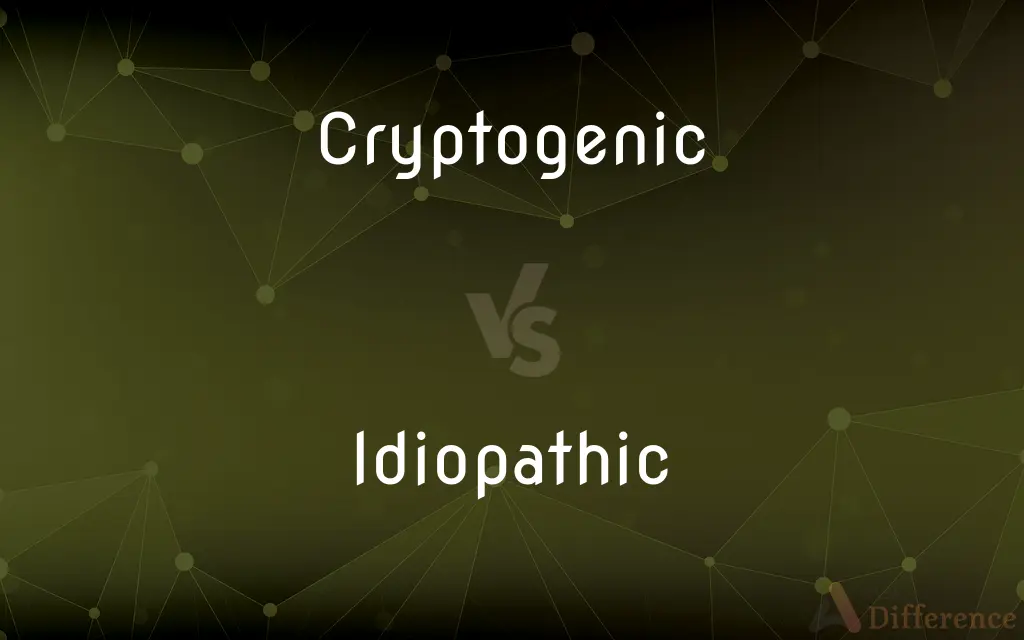Cryptogenic vs. Idiopathic — What's the Difference?
By Maham Liaqat & Fiza Rafique — Updated on April 4, 2024
Cryptogenic refers to diseases with obscure or unknown origins, focusing on the lack of identifiable causes, while idiopathic emphasizes conditions whose causes are specifically unknown despite thorough investigation.

Difference Between Cryptogenic and Idiopathic
Table of Contents
ADVERTISEMENT
Key Differences
Cryptogenic diseases puzzle medical professionals because their origins remain obscured even after extensive investigation. These conditions lack clear diagnostic markers, making it challenging to pinpoint their causes. On the other hand, idiopathic conditions are also characterized by unknown causes, but the term is often used when the condition has undergone exhaustive investigations, suggesting a deeper mystery despite advanced medical scrutiny.
In the context of diagnosis, cryptogenic signifies that a disease's cause is hidden or not yet revealed, often leading to a broad approach in treatment and management strategies. Whereas idiopathic conditions, despite their unknown causes, usually follow specific diagnostic criteria that exclude known diseases, allowing for more targeted management approaches based on symptoms and empirical evidence.
Cryptogenic conditions sometimes become less mysterious as medical research advances, uncovering new diagnostic techniques or understanding of diseases. This shift can lead to reclassification from cryptogenic to a more defined category. Idiopathic diseases, however, remain in a category of their own, often becoming the subject of specialized research efforts aimed at uncovering new knowledge about disease mechanisms and potential causes.
Research into cryptogenic diseases often focuses on identifying new pathogens, genetic markers, or environmental factors that could explain their occurrence. In contrast, research into idiopathic diseases may delve into more nuanced aspects of genetics, immunology, and epidemiology, seeking clues that are less apparent and require cutting-edge technology to uncover.
While cryptogenic diseases leave room for discovery of their causes, idiopathic diseases represent a frontier in medical science, challenging researchers to decode the mysteries of the human body and disease processes. Both terms highlight the limitations of current medical knowledge, but also the potential for future breakthroughs that can transform understanding and treatment of these perplexing conditions.
ADVERTISEMENT
Comparison Chart
Definition
Refers to diseases whose causes are hidden or not yet discovered.
Pertains to diseases whose causes remain unknown despite thorough investigation.
Diagnostic Approach
Broad, due to the lack of identifiable causes.
Targeted, based on symptoms and exclusion of known diseases.
Research Focus
Often on identifying new diagnostic markers or causes.
Concentrated on understanding deeper, often molecular or genetic, mechanisms.
Evolution of Term
Can change as new discoveries are made.
Remains constant, emphasizing the unknown despite research.
Clinical Implications
Emphasizes the need for a broad diagnostic and treatment strategy.
Suggests a more specific approach based on symptom management and empirical evidence.
Compare with Definitions
Cryptogenic
Pertaining to diseases with unknown origins due to obscure causes.
A patient diagnosed with a cryptogenic stroke has no identifiable cause for the stroke despite extensive tests.
Idiopathic
Describing conditions with unknown causes despite comprehensive investigation.
Idiopathic pulmonary fibrosis is diagnosed when no other cause for lung scarring is found.
Cryptogenic
Involving conditions where the cause is hidden or undetectable with current medical knowledge.
Cryptogenic liver disease challenges doctors because of its undetermined origin.
Idiopathic
Focused on diseases that exclude known causes through detailed diagnostics.
Patients with idiopathic arthritis are treated based on symptoms, as the cause remains elusive.
Cryptogenic
Signifying diseases that remain mysterious even after rigorous investigation.
Cryptogenic epilepsy cases are particularly perplexing, lacking clear etiological explanations.
Idiopathic
Pertains to medical mysteries that persist even with advanced research.
Idiopathic diseases often become the focus of specialized research efforts.
Cryptogenic
Relating to illnesses that could be reclassified upon discovery of their causes.
Many diseases once considered cryptogenic have been reclassified thanks to medical advancements.
Idiopathic
Relates to conditions where treatment is empirical, based on symptom management.
Idiopathic seizures are managed with medication tailored to control episodes, not cure the cause.
Cryptogenic
Highlighting the limitations of current diagnostic capabilities.
Cryptogenic infections underscore the need for advanced diagnostic tools in medicine.
Idiopathic
Indicates a gap in medical understanding, inviting future discoveries.
Idiopathic conditions challenge researchers to uncover the intricacies of the human body.
Cryptogenic
Of obscure or unknown origin. Used of diseases.
Idiopathic
Of, relating to, or designating a disease having no known cause.
Cryptogenic
(of an organism) Of uncertain origin, either introduced or native to its area.
Idiopathic
(pathology) Of, relating to, or designating a disease or condition having no known cause.
Cryptogenic
(of epilepsy) Presumed but not proven to be caused by an abnormality in a particular part of the brain (contrasts with symptomatic and idiopathic).
Idiopathic
Pertaining to idiopathy; characterizing a disease arising primarily, and not in consequence of some other disease or injury; - opposed to symptomatic, sympathetic, and traumatic.
Cryptogenic
(of a disease) Of uncertain cause.
Idiopathic
(of diseases) arising from an unknown cause;
Idiopathic epilepsy
Common Curiosities
How is idiopathic different from cryptogenic?
Idiopathic specifically denotes conditions whose causes remain unknown even after exhaustive investigation, while cryptogenic implies a hidden cause that has yet to be uncovered.
Are cryptogenic conditions always permanent?
Not necessarily; as medical knowledge and diagnostic techniques advance, the causes of some cryptogenic conditions may be discovered.
Can a disease be both cryptogenic and idiopathic?
While they focus on unknown causes, idiopathic emphasizes a deeper level of investigation with no found cause, so they're used in different contexts rather than simultaneously.
What does cryptogenic mean in medical terms?
Cryptogenic refers to diseases with hidden or obscure origins, where the cause is not identified despite investigation.
What is an example of an idiopathic disease?
Idiopathic pulmonary fibrosis is an example, where the scarring of lung tissue occurs without a known cause.
How do patients cope with the uncertainty of cryptogenic or idiopathic diagnoses?
Patients may focus on symptom management, lifestyle adjustments, and support from healthcare providers and communities.
Why is research important for cryptogenic and idiopathic diseases?
Research helps uncover new knowledge about disease mechanisms, potentially leading to effective treatments or reclassification of diseases.
What is the significance of diagnosing a condition as idiopathic?
It indicates that the disease is a specific entity with an unknown cause despite thorough investigation, guiding symptom management.
How do doctors treat cryptogenic diseases?
Treatment is often broad and symptomatic, focusing on managing symptoms rather than targeting a specific cause.
What advancements could help identify the causes of cryptogenic and idiopathic diseases?
Advances in genetics, molecular biology, and imaging technologies may unveil causes of these diseases.
Can cryptogenic diseases become idiopathic with more research?
Cryptogenic diseases may remain so or be reclassified if causes are identified; idiopathic status specifically denotes an unknown cause despite research.
How does the classification of diseases as cryptogenic or idiopathic affect patient care?
It influences the diagnostic and treatment approach, focusing on symptom management and empirical treatment in the absence of a known cause.
Do cryptogenic and idiopathic diseases have a genetic component?
Some may have genetic factors that contribute to their development, though the exact cause remains unknown.
What role does epidemiology play in understanding cryptogenic and idiopathic diseases?
Epidemiology helps identify patterns and potential risk factors that might shed light on the causes of these diseases.
Is it common for new diseases to be initially classified as cryptogenic or idiopathic?
Yes, new diseases are often classified as such until more is understood about their origins and mechanisms.
Share Your Discovery

Previous Comparison
Fieldstone vs. Stone
Next Comparison
Via vs. VideAuthor Spotlight
Written by
Maham LiaqatCo-written by
Fiza RafiqueFiza Rafique is a skilled content writer at AskDifference.com, where she meticulously refines and enhances written pieces. Drawing from her vast editorial expertise, Fiza ensures clarity, accuracy, and precision in every article. Passionate about language, she continually seeks to elevate the quality of content for readers worldwide.














































